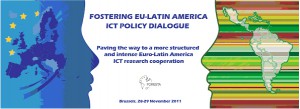Telefónica Public Policy & Telefónica España Regulatory teams
 Last week, the leaders of the FORESTA project organized a 2-day seminar in Brussels titled “Fostering EU-Latin America ICT Policy Dialogue”. The event achieved the challenging objective of bringing together several activities that have been undertaken in cooperation between EU and Latin-American countries. Panels of experts from industry, government, academia, research as well as the European Commission, presented their experiences, best practices and success cases. I had the honour to attend the roundtable on “Sustainable ICT to face economic crisis and support social inclusion: how can Europe and Latin America work together” in which I explained the opportunities to enhance social inclusion through the use of ICT. The seminar finalized with a Joint Declaration to strengthen the EU-LAC cooperation in ICT research, development and innovation (R&D+i). This Joint Declaration responds to the need of identifying common obstacles, challenges, synergies and future opportunities in EU-LAC cooperation in the field of ICT; and grounds on the results of studies, activities, meetings and discussion brought forward by stakeholders partnered in a number of project initiatives.
Last week, the leaders of the FORESTA project organized a 2-day seminar in Brussels titled “Fostering EU-Latin America ICT Policy Dialogue”. The event achieved the challenging objective of bringing together several activities that have been undertaken in cooperation between EU and Latin-American countries. Panels of experts from industry, government, academia, research as well as the European Commission, presented their experiences, best practices and success cases. I had the honour to attend the roundtable on “Sustainable ICT to face economic crisis and support social inclusion: how can Europe and Latin America work together” in which I explained the opportunities to enhance social inclusion through the use of ICT. The seminar finalized with a Joint Declaration to strengthen the EU-LAC cooperation in ICT research, development and innovation (R&D+i). This Joint Declaration responds to the need of identifying common obstacles, challenges, synergies and future opportunities in EU-LAC cooperation in the field of ICT; and grounds on the results of studies, activities, meetings and discussion brought forward by stakeholders partnered in a number of project initiatives.
Information and Communications Technologies (ICT) are crucial to improve access to health and education services and to create new sources of income and employment in agriculture and overall trade. As the OCDE confirms in all its reports, being able to access and use ICT has become a major factor in driving competitiveness, economic growth and social development. In particular, mobile phones are opening new channels for connectivity and contributing to the free flow of ideas and opinions.
However, there are a couple of concerns from an industry perspective:
First, the need to identify the role that governments should play in broadband development. We believe in the development of private-public partnerships for deployment in remote rural areas and at the same time, think that the Governments should do more to promote the use and teach of ICT.
Secondly, the factor of regulation – as always in the telecom sector – is also important. Very much has been spoken about innovative services like mobile banking, that grants access to micro-financial services to the poorest. When Governments refrain from limiting the development of innovative services related to the ICTs, many new possibilities open for development.
As I mentioned before, ICT offer a great opportunity to enhance social inclusion. Telefonica, for instance, promotes social development in Latin-America through its Proniño Programme. This programme focuses on helping the eradication of child labour and it grants families, so the kids can attend classes. In the last years, we have managed to take 211.649 children back to school.
Education is also an issue where we are very concerned. We are working very intensively with teachers in Latin-America to modernise education in the countries where we are, improving teaching and learning techniques and taking into schools the transformation that ICTs are bringing in other levels of society. So far, 260.000 teachers are actively involved in our community EducaRed.
Therefore, we welcome all those initiatives which aim to ensure that all people can enjoy the benefits of new technologies wherever they live, their economic resources, education level or disabilities they may have. Do you have any ideas for new initiatives where ICT could play a role?
Post written in collaboration with David Frautschy, Manager of Latin-American Affairs.







